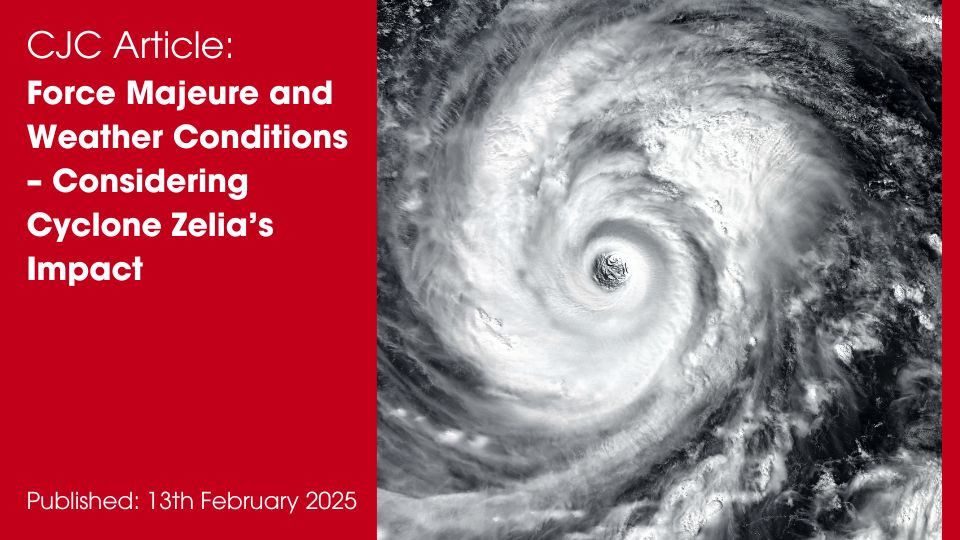As Cyclone Zelia hits the coast of Australia, CJC Director, Allen Marks and Associate, David Fittis assess its impact and the inevitable Force Majeure declarations, and summarise the pertinent areas to be considered.
Cyclone Zelia Hits Australia
As widely reported, the category 5 Cyclone Zelia has brought disruption to the Western Coast of Australia and is to continue with winds in excess of 280hm/h. According to the Australian Bureau of Meteorology, the Cyclone is due to make landfall on Friday evening.
Severe disruption is expected at Australian ports, with Port Hedland, the world’s largest export point for iron ore, being forced to close. Tradewinds reports that Rio Tinto last week started to clear ships at two Australian ports as a consequence of two tropical cyclones.
Force Majeure – An Inevitably?
Parties will likely be unable to fulfil their contractual obligations as a result of the cyclone and most charterparties will incorporate a Force Majeure clause. These clauses will state that a party shall not be considered in default or breach of its obligations under the charterparty as a result of certain specified events. Consequently, a flurry of Force Majeure declarations at affected Australian ports should be expected.
As a matter of English law, there is no general doctrine of Force Majeure and most such clauses are designed as exceptions clauses (to except a voyage charterer from paying demurrage). Most, if not all, Force Majeure clauses will account for weather phenomenon such as storms. Careful consideration must be given to the exact wording of the Force Majeure clause, on a case-by-case basis, by the party seeking to invoke it. The burden of proof lies with the party relying on the clause and they should always be alive to the fact that the clause might contain a “reasonable endeavours” provision which compels reasonable steps to be taken to minimise any impact of the event.
With reference to the events at Australian ports, a charterer under a voyage charter might seek to declare Force Majeure in respect of an inability to discharge cargo within the laytime, or an owner might be unable to deliver a vessel into service. Likewise, sales contracts may be unable to be fulfilled if cargo was to be loaded or discharged at an affected Australian port.
Consideration must also be given to the timeframe within which the relying party must issue its declaration of Force Majeure. A specified number of days, or “as soon as possible”, may be stipulated contractual requirement to be permitted to rely on force majeure.
Careful consideration of factual evidence is imperative to build a picture of the causative factor at the material time. With the passage of time, the causative nature of a Force Majeure event may diminish, i.e. congestion will likely occur and an owner might reasonably point to that being causative of delay rather than the cyclone. CJC is well-versed in these contentious matters and offers a round-the-clock service to advise.
Summary – Best Practice When Declaring Force Majeure
- Collate and preserve all factual evidence for consideration.
- If issuing a declaration of Force Majeure, firstly consider whether the event upon which reliance is placed is defined as a Force Majeure event in the clause and issue the declaration as soon as possible, always bearing in mind the timeframe stipulated within the contract.
- If seeking to object to a Force Majeure declaration, consider the evidence and the causative event. Often, multiple events will occur at a port or on a voyage – when considering a Force Majeure declaration, always consider the facts. Although a Force Majeure event may have previously occurred, it may not always be the causative factor for a failure to perform contractual obligations.
CJC routinely acts on both sides of Force Majeure disputes. For further information, please contact Allen Marks, David Fittis, or any of the CJC Team.

